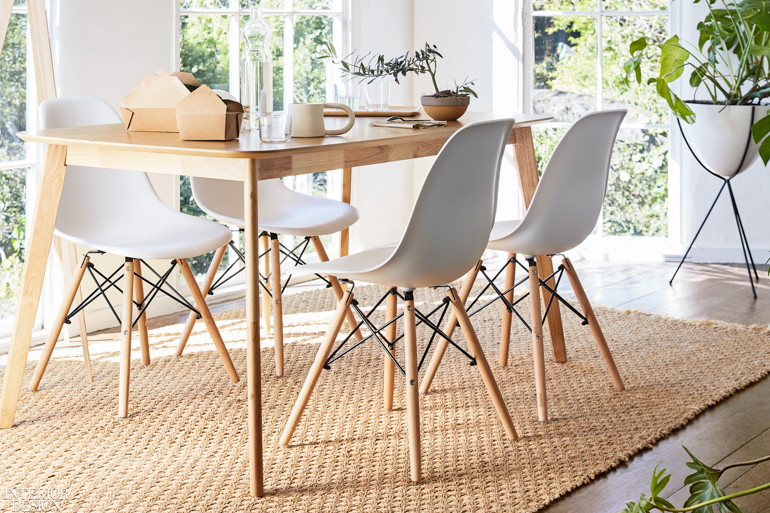Feather Wants to Change the Way City Dwelling Millennials Think About Furniture

Buying your first sofa—the perfect one that expresses your design or color preference—has long been a rite of passage for recent college grads embarking on careers in cities like New York or San Francisco. It was a big decision and demanded a major financial commitment. Since founding Feather—a furniture subscription service that offers a flexible and sustainable alternative to ownership—in 2017, Jay Reno has been trying to make that decision obsolete.
Why buy when you can subscribe—and change things up as your living conditions evolve? That’s the premise of Feather, which Reno based on his own experience: He lived in six different apartments during his first eight years in New York. Frequent moves—from sharing a space with roommates to striking out on your own to moving in with a significant other—often result in furniture that is unwanted because it no longer fits your space or lifestyle.
 As an alternative to trying to sell furniture or lugging it to the curb—and inevitably the landfill—Reno saw a solution in a circular approach that eliminates the need for single-use furniture. Feather members can enjoy a range of sofas, tables, chairs, beds and other items when they need them and then Feather will refurbish the pieces and give them a new home when they don’t. But each payment goes toward owning, so members who feel attached to a piece can always make it their own.
As an alternative to trying to sell furniture or lugging it to the curb—and inevitably the landfill—Reno saw a solution in a circular approach that eliminates the need for single-use furniture. Feather members can enjoy a range of sofas, tables, chairs, beds and other items when they need them and then Feather will refurbish the pieces and give them a new home when they don’t. But each payment goes toward owning, so members who feel attached to a piece can always make it their own.
For now, Feather is available to residents of New York City, San Francisco, Los Angeles and Orange County—the latter two added in May 2019 after the company received $12 million in equity funding. And while Reno isn’t sharing public plans for additional expansion, he does believe “this is a practical, flexible service that city dwellers everywhere can benefit from.”
Read on for his answers to questions about Feather’s membership model, ground-up logistics development, and role as a disruptor brand.
Interior Design: What inspired you to create Feather?
Jay Reno: After studying Entrepreneurship in undergrad and building a few startups, I developed an interest in sustainable business, which led me to pursue a Master’s in Climate and Environmental Science at Columbia. I launched Feather because I saw two problems that I wanted to address: One, the average city dweller moves every one to two years, and they need a more practical, flexible way to own furniture throughout these changes; and Two, fast furniture isn’t sustainable.
ID: Do you view Feather as a “disruptor” brand?
JR: Absolutely. I see Feather as a disruptor in a few ways. By offering a subscription-based path to ownership, we’re challenging traditional consumer habits and encouraging people to question their relationship with material goods. We’re also trying to drive a more transparent conversation about fast furniture. People have been taught to think that a low price tag equals good value; in reality, the cost of the proliferation of these single-use items is incredibly high for the planet, and it’s not a good investment for the consumer because these items aren’t durable and may even cost money to dispose. With Feather, people can get beautiful furniture without the upfront cost and commitment, and it will be conveniently delivered and assembled in less than a week. And by extending the life of quality pieces with refurbishment, we’re doubling down on the idea that furniture should be built to last.

ID: Describe the membership model. What is the advantage of becoming a Feather member?
JR: Feather is a furniture subscription service that makes it possible for people to get stylish furniture delivered and set up quickly and conveniently. We offer subscription plans that give customers access to over 150 pieces of high-quality furniture from brands like West Elm, Pottery Barn, Casper, Joybird, and our own Feather label. An annual subscription is $19/month, and these members get access to all furniture items at discounted monthly prices. Annual subscription members also have the option to change out their furniture annually at no cost, plus they get free furniture delivery and assembly within seven days of joining.
ID: Will you offer To the Trade memberships in the future?
JR: We do not currently offer To the Trade memberships in the traditional sense, but our enterprise program is a great option for interior designers who are looking to select furniture for their projects.
ID: What can other startups and established manufacturers learn from Feather’s reverse logistics model and subscription services?
JR: There were no off-the-shelf reverse logistics software or systems we could directly apply to our subscription business model, so we chose to build everything internally from the ground up. While this might seem like a daunting task, it has ultimately allowed us to have more control and to engineer the customer experience to our own standards. We continue to evolve and improve the delivery process based on first-hand feedback from our operations and logistics teams as we scale. So, I guess I would say if you value this level of control and insight, don’t be afraid to build something new.
Read more: 10 Cool and Innovative Products from Best of Year 2018 Winners


